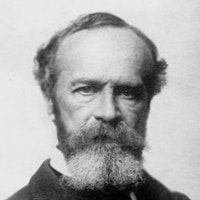The [Twice Born] process is one of redemption, not of mere reversion to natural health…
William James

Being Twice Born
Topic: Self-Cultivation & Health
The [Twice Born] process is one of redemption, not of mere reversion to natural health, and the sufferer, when saved, is saved by what seems to him a second birth, a deeper kind of conscious being than he could enjoy before.
William James was born on January 11, 1842, in New York City, into a wealthy and intellectually stimulating family. He was the eldest of five children, including his brother Henry James, who would become a renowned novelist. William's father, Henry James Sr., was a Swedenborgian theologian whose unconventional ideas greatly influenced his children. The family traveled extensively in Europe during William's youth, exposing him to diverse cultures and educational systems. James initially pursued painting but eventually turned to science, enrolling at Harvard Medical School in 1864. He earned his M.D. in 1869 but never practiced medicine, instead focusing on psychology and philosophy. James married Alice Gibbens in 1878, and they had five children together. He died on August 26, 1910, at his summer home in Chocorua, New Hampshire.
James's psychological research and writings were groundbreaking and influential. He is often referred to as the "Father of American Psychology" for his pioneering work in the field. In 1890, he published his seminal work, "The Principles of Psychology," which became a foundational text in the discipline. James introduced several key concepts, including the stream of consciousness, the James-Lange theory of emotion, and the idea of habit formation. He was also one of the first to explore the subconscious mind and its influence on behavior. James's approach to psychology was marked by its emphasis on individual experience and the practical applications of psychological insights. He was a proponent of pragmatism in philosophy and functionalism in psychology, both of which focused on the practical consequences of ideas and mental processes.
Throughout his life, James maintained a deep interest in spirituality and wisdom traditions, which significantly influenced his philosophical and psychological work. His exploration of these topics is most evident in "The Varieties of Religious Experience" (1902), based on his Gifford Lectures. In this work, James examined the nature of religious and mystical experiences from a psychological perspective, arguing for their validity and importance in human life. He was particularly interested in the practical effects of religious belief on individuals and society. James's approach to spirituality was notably open-minded and pluralistic; he sought to understand diverse religious experiences without reducing them to mere psychological phenomena. His work in this area continues to be influential in the fields of religious studies, psychology of religion, and philosophy of religion, bridging the gap between scientific inquiry and spiritual exploration.
The Varieties of Religious Experience
James, William. The Varieties of Religious Experience: A Study of Human Nature. London: Penguin Books, 1902.

William James
Theme: Healing

About This William James Quotation [Commentary]
William James highlights the transformative nature of suffering through the concept of being “twice-born.” For James, healing after deep emotional or psychological crises does not simply involve a return to a previous state of well-being. Instead, it is a redemptive process, leading to a transformation and renewal of consciousness. The “twice-born” individual emerges with a deeper understanding of themselves and the world, moving beyond the simplicity of mere recovery. This reflects James’s belief that real personal growth often comes through challenges and suffering.
The “twice-born” idea suggests a kind of spiritual or existential healing. James explains that those who undergo this transformation do not just regain health or happiness; they are instead reborn into a more meaningful state of existence. This healing is not about returning to a former state but about discovering a new depth of awareness and purpose. The sufferer, according to James, finds renewal by moving beyond their prior state, entering a richer form of conscious life.
With healing in mind, James’s perspective offers a reminder that true recovery often requires a shift in consciousness. The redemption he describes is not about fixing what was lost, but about evolving into something greater. The crisis acts as a catalyst for growth, allowing the individual to emerge with a renewed sense of purpose and clarity. This deeper healing is a gift only those who face suffering can fully understand.
Additional William James Quotes
“The real witness of the spirit to the second birth is to be found only in the disposition of the genuine child of God, the permanently patient heart, the love of self eradicated. And this, it has to be admitted, is also found in those who pass no crisis, and may even be found outside of Christianity altogether.”
—William James [The Varieties of Religious Experience: A Study in Human Nature (1902) Lecture X, “Conversion, concluded”].
Related Quotes
Copyright © 2017 – 2024 LuminaryQuotes.com About Us